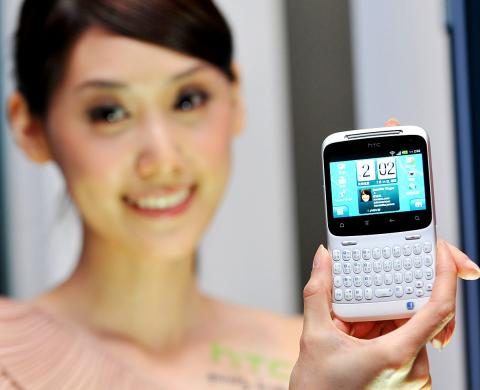HTC Corp (宏達電), the world’s No. 5 smartphone maker, is planning to collaborate with Taiwanese retail partners to boost its smartphone sales in China, a company executive said on Thursday.
The Taoyuan-based company began using its HTC brand last year to sell smartphones in China, and Jack Tong (董俊良), president of HTC North Asia, said the strategy has paid off, with sales growing at a stable pace in the second quarter.
“This year we will focus on the increase of retail locations and the connection between our brand and channels,” Tong said at a press conference to launch the HTC ChaCha smartphone.

Photo: Patrick Lin, AFP
“Taiwanese retailers Senao International Co (神腦國際) and Synnex Corp (聯強國際) both have a roadmap in China, and we’re in talks with them on cooperative efforts that will mobilize sufficient retail resources in tier one and tier two Chinese cities to increase our sales,” he said.
In the period from April to last month, HTC’s revenue and smartphone shipments in East and Southeast Asia maintained a high level of growth and were in line with the company’s expectations, especially in Taiwan, Vietnam, Hong Kong, South Korea and China, according to Tong.
“Our smartphone sales in Taiwan hit a high in the second quarter, driven by the high purchase volume of domestic telecoms operators,” he said.
“We’ll try hard to retain our good relationship with these carriers, hoping that third-quarter sales will grow sharply from the previous quarter on the back of such models,” he said.
The company had consolidated sales of NT$124.4 billion (US$4.3 billion) in the second quarter, a quarterly record for the company and higher than analysts’ prediction of NT$120 billion.
Meanwhile, HTC yesterday denied a newspaper report that VIA Technologies Inc (威盛電子) is considering selling patents to the company, according to a statement to the Taiwan Stock Exchange.
Both HTC and VIA are run by Cher Wang (王雪紅), the richest person in Taiwan according to Forbes magazine’s list of billionaires that was published in March.
The Commercial Times, a -Chinese-language newspaper, said VIA might sell more patents to HTC in a bid to help the latter win patent lawsuits against Apple Inc.
This report came after HTC last week announced it would buy California--based S3 Graphics Co from VIA for US$300 million, as the initial ruling from the US International Trade Commission earlier this month suggested Apple infringed on two patents held by S3 Graphics.
“The report is purely media speculation and untrue,” HTC chief financial officer Winston Yung (容覺生) said in the statement.
ADDITIONAL REPORTING BY KEVIN CHEN

Sweeping policy changes under US Secretary of Health and Human Services Robert F. Kennedy Jr are having a chilling effect on vaccine makers as anti-vaccine rhetoric has turned into concrete changes in inoculation schedules and recommendations, investors and executives said. The administration of US President Donald Trump has in the past year upended vaccine recommendations, with the country last month ending its longstanding guidance that all children receive inoculations against flu, hepatitis A and other diseases. The unprecedented changes have led to diminished vaccine usage, hurt the investment case for some biotechs, and created a drag that would likely dent revenues and

Macronix International Co (旺宏), the world’s biggest NOR flash memory supplier, yesterday said it would spend NT$22 billion (US$699.1 million) on capacity expansion this year to increase its production of mid-to-low-density memory chips as the world’s major memorychip suppliers are phasing out the market. The company said its planned capital expenditures are about 11 times higher than the NT$1.8 billion it spent on new facilities and equipment last year. A majority of this year’s outlay would be allocated to step up capacity of multi-level cell (MLC) NAND flash memory chips, which are used in embedded multimedia cards (eMMC), a managed

CULPRITS: Factors that affected the slip included falling global crude oil prices, wait-and-see consumer attitudes due to US tariffs and a different Lunar New Year holiday schedule Taiwan’s retail sales ended a nine-year growth streak last year, slipping 0.2 percent from a year earlier as uncertainty over US tariff policies affected demand for durable goods, data released on Friday by the Ministry of Economic Affairs showed. Last year’s retail sales totaled NT$4.84 trillion (US$153.27 billion), down about NT$9.5 billion, or 0.2 percent, from 2024. Despite the decline, the figure was still the second-highest annual sales total on record. Ministry statistics department deputy head Chen Yu-fang (陳玉芳) said sales of cars, motorcycles and related products, which accounted for 17.4 percent of total retail rales last year, fell NT$68.1 billion, or

In the wake of strong global demand for AI applications, Taiwan’s export-oriented economy accelerated with the composite index of economic indicators flashing the first “red” light in December for one year, indicating the economy is in booming mode, the National Development Council (NDC) said yesterday. Moreover, the index of leading indicators, which gauges the potential state of the economy over the next six months, also moved higher in December amid growing optimism over the outlook, the NDC said. In December, the index of economic indicators rose one point from a month earlier to 38, at the lower end of the “red” light.